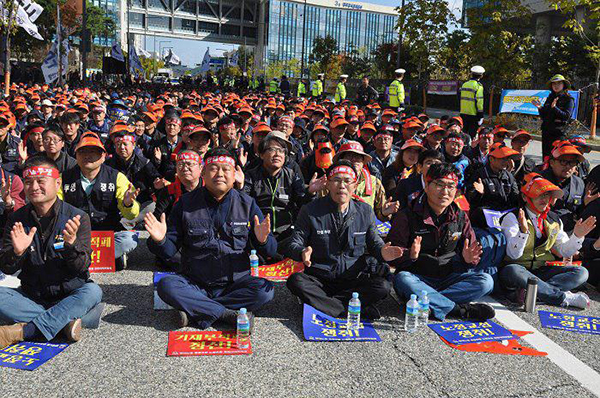
The Public Institutions Committee, one of an industry or sector-based committees in the structure of the Economic, Social and Labor Council(ESCL) is expected to kick off as early as next week. The Ministry of Economy and Finance(MOEF) and the labor circle narrowed gaps in their differences by making mutual concessions as regards the composition and agenda of the Public Institutions Committee. The MOEF pulled back their insistence on the participation of the Korea Employers' Federation(KEF) and the Korea Chamber of Commerce and Industry(KCCI) in the committee. The labor circle on the other hand accepted the two-track proposal of the government on the condition that part of the committee agenda shall be separately consulted between the government and the labor circle.
According to the MOEF and the Joint Countermeasures Committee by the public sector trade unions of the Federation of Korean Trade Unions(FKTU) and the Korean Confederation of Trade Unions(KCTU) on November 6, they recently came close to an agreement on the composition and the agenda of the Public Institutions Committee for which the two sides had remained apart.
The Joint Countermeasures Committee held a top representatives meeting on the morning of November 6 and approved the amended proposal regarding the composition of committee members and the agenda of the Public Institutions Committee made by the MOEF in the ' 2nd Working Group Meeting for the Public Institutions Committee'. The working group meeting was hosted by the ESLC on November 5.
The MOEF stuck to the stance to include the Korea Employers Federation(KEF) and the Korea Chamber of Commerce and Industry(KCCI) with the status of representing 'the business circle and employers' in the composition of the Public Institutions Committee members up until in the 1st Working Group Meeting held in early this month. The labor circle opposed the participation of KEF and KCCI, citing the problems of representativeness and accountability. The MOEF made a new proposal for the composition of the Public Institutions Committee comprising members of the government, labor and the public interest, removing the category of 'the business circle and employers' in the 2nd Working Group Meeting.
The Public Institutions Committee will be composed of 15 members including the chair person: 5 from the labor circle(executives from five public sector trade unions of the Joint Countermeasures Committee); 5 from the government(director generals from Ministry of Economy and Finance, Ministry of the Interior and Safety, Ministry of Employment and Labor, Ministry of Land, Infrastructure and Transport, Ministry of Trade, Industry and Energy); 4 public interest members(two members each recommended by the government and the labor circle).
The Joint Countermeasures Committee accepted the MOEF proposal for a bilateral discussion exclusively on the two agendas of "the restoration to the original collective agreements and the guarantee of basic labor rights" and "the abolition of the wage peak system guideline", selected from the eight agendas proposed by the labor circle. On top of that, the MOEF put forward a precondition to conduct the consultation in good faith. Other agendas are expected to be further discussed for the confirmation in the 3rd Working Group Meeting scheduled on November 9.
reported by Bae Hye-jung
translated by Kim Sung-jin

